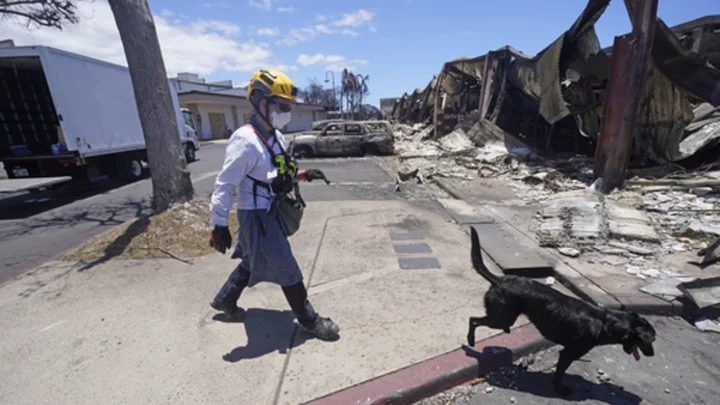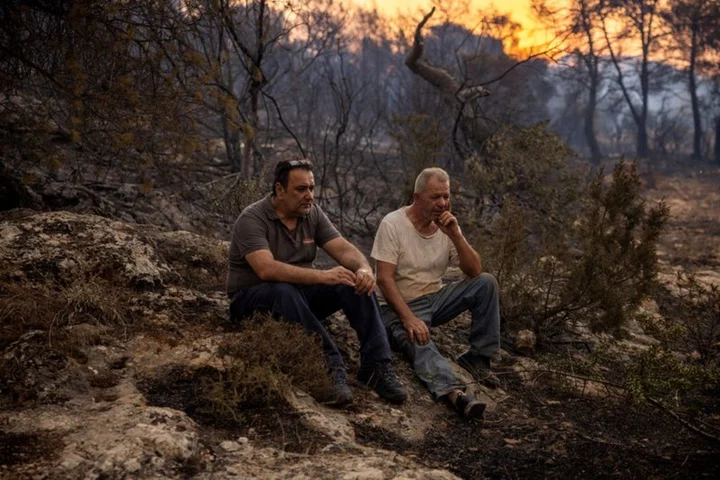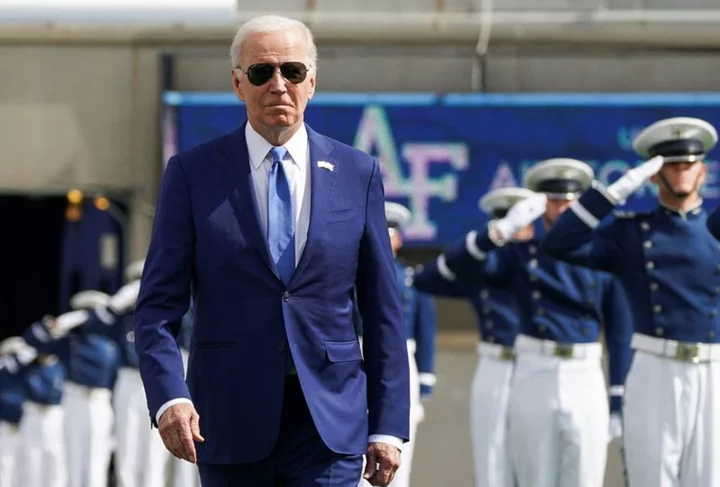As flames tore through a West Maui neighborhood, car after car of fleeing residents headed for the only paved road out of town in a desperate race for safety.
And car after car was turned back toward the rapidly spreading wildfire by a barricade blocking access to Highway 30.
One family swerved around the barricade and was safe in a nearby town 48 minutes later, another drove their 4-wheel-drive car down a dirt road to escape. One man took an dirt road uphill, climbing above the fire and watching as Lahaina burned. He later picked his way through the flames, smoke and rubble to pull survivors to safety.
But dozens of others found themselves caught in a hellscape, their cars jammed together on a narrow road, surrounded by flames on three sides and the rocky ocean waves on the fourth. Some died in their cars, while others tried to run for safety.
“I could see from the bypass that people were stuck on the balconies, so I went down and checked it out,” said Kekoa Lansford, who made several trips into town to look for survivors. What he found was horrible, Lansford said, with dead bodies and flames like a hellish movie scene. “And I could see that people were on fire, that the fire was just being stoked by the wind, and being pushed toward the homes.”
The road closures — some because of the fire, some because of downed power lines — contributed to making historic Lahaina the site of the deadliest U.S. wildfire in more than a century. But there were many problems that day, and in some ways the disaster began long before the fires started.
A flash drought in the region provided plenty of kindling, and Hurricane Dora brought strong winds to Maui as it passed roughly 500 miles (800 kilometers) south of the Hawaii island chain. Those winds downed at least 30 power poles in West Maui, and Hawaiian Electric had no procedure in place for turning off the grid — a common practice in other fire-prone states. Video shot by a Lahaina resident shows a downed powerline setting dry grasses alight, possibly revealing the start of the larger fire.
And later, as the fire began to swallow homes in its ravenous path, Maui County emergency officials declined to use an extensive network of emergency sirens to alert Lahaina’s residents to flee.
During a news conference Tuesday, Maui Police Chief John Pelletier said police officers drove up and down streets, knocking on doors and using loudspeakers to tell people to leave, but he didn't say exactly where and what time those efforts occurred. The Associated Press has filed public records requests for location reports and other documentation including video and internal communications to clarify the details of the police and fire response, but Maui County has not yet released that information.
A team of Associated Press journalists documented the first hours of the deadly wildfire by interviewing dozens of survivors and public officials, examining public documents and analyzing citizen videos, satellite images and publicly available data. The timeline reveals the chaos that overtook the town.
Shane Treu wakes early on Aug. 8, and is in his backyard when he hears a utility pole snap next to Lahainaluna Road. He sees the downed powerline ignite the grass, and calls 911 at 6:37 a.m. to report the fire.
Small brush fires aren't unusual for Lahaina, and the fire department declares this one 100% contained by 9:55 a.m. The assurance puts many residents at ease; the high winds have prompted the closure of some public schools for the day, and others have not yet started. That means many of Lahaina's 3,000 public school students are home alone while their parents work.
Contained is not controlled, however, and the town is being battered by high winds. While many of Maui County's fire crews work to extinguish the Upcountry fire on the eastern half of the island, the wind is toppling power poles and scattering embers like seeds in Lahaina.
Treu's neighbor Robert Arconado said the fire reignites around 2 p.m. He records video of it spreading at 3:06 p.m., as large plumes of smoke rise near Lahainaluna Road and are carried downtown by the wind.
Around 3:20 p.m., Lahaina resident Kevin Eliason is watching the black smoke from a vantage point closer to downtown when passersby tell him a power pole has been knocked onto the tar roof of a gas station two blocks away, creating fireballs that are being blown in the wind, he said.
Eliason said the fire knocked the power out in the area soon after.
Ten minutes later, Hawaiian Electric sends a news release asking Maui residents to prepare for extended outages. The utility says more than 30 power poles are down in West Maui, including along the Honoapiilani Highway at the south end of Lahaina. At the same time, the fire department closes the Lahaina Bypass road because of the fire.
The closures block the only route out of Lahaina to the south. Two weeks later, Maui Police Chief John Pelletier says during a news conference that officers never stopped people from leaving Lahaina that day but did try to prevent them from driving over live power lines.
Back in the subdivision near Lahainaluna Road, the first sign of trouble for Nate Baird and Courtney Stapleton comes at 3:40 p.m., when their 9- and 10-year-old sons say they can smell s'mores.
By the time the family piles into the car with their dog and Baird's mother and joins a caravan of evacuating residents, parts of the subdivision are beginning to burn. A telephone pole falls behind their car, causing an accident and blocking a side street.
Meanwhile, police officers knock down a fence to help others escape, the police chief says later. Firefighters in the area nearly become trapped themselves, losing a truck to the flames, Pelletier says.
When Baird and his family turn south to drive out of town, the way is blocked by cones and a crew working on downed electric poles. The workers were motioning for everyone to turn back toward Lahaina.
They decide they don't care what the crew wants, swerving around the cones and heading south. They make it to a neighboring town by 4:18 p.m. and begin texting people to see who else has made it out.
“Nobody realized how little time we really had,” Baird said. “Like even us being from the heart of the fire, we did not comprehend. Like we literally had minutes and one wrong turn. We would all be dead right now.”
Jonelle Santos said her daughter, Ronelle Santos-Adrian, managed to escape her Lahaina affordable housing apartment with her 3-year-old daughter and partner by turning their four-wheel-drive vehicle away from the standstill traffic and onto a dirt road, eventually finding their way to a friend’s house in Napili. Some of the other people who lived in the apartment complex didn’t have cars, Santos said, and her daughter thinks some of them didn’t make it out.
Kim Cuevas-Reyes narrowly escapes with her 12- and 15-year-old by ignoring instructions to turn right on Front Street toward Lahaina’s Civic Center, which earlier in the day had been turned into a shelter for refugees. Instead, she takes a left, driving in the wrong lane to pass a stack of cars heading in the other direction.
“The gridlock would have left us there when the firestorm came,” said Cuevas-Reyes, 38. “I would have had to tell my children to jump into the ocean as well and be boiled alive by the flames or we would have just died from smoke inhalation and roasted in the car.”
At 5:20 p.m., Maui County shares another update on Facebook. The road leading south out of Lahaina has been cleared and is open for traffic, the county says.
But by then, some on Front Street have already died, according to survivor accounts. Others have jumped over the seawall and are treading water, dodging flaming debris and breathing overheated black smoke.
At some point, police begin directing people away from Front Street, Pelletier says, “because it had already gotten too late.” He does not say exactly when that that point is reached.
A private ambulance company calls the U.S. Coast Guard at about 5:45 p.m., asking for help transporting 10 injured people from Lahaina to Maalaea because a fire is blocking road access to Lahaina. It is the Coast Guard's first notification of the fire.
People in the water and on boat moorings use flashlights and phones to guide the boats through the thick smoke. The Coast Guard rescues nearly 40 people from the shore, and pulls 17 people from the water while civilians help pull more from the ocean. The rescue efforts stretch into the early morning hours.
Kekoa Lansford is among the rescuers. Earlier, he had climbed a hill behind the town and watched as the city burned, trying to gauge when it would be safe to return. Lansford said he knew people would need help “because the roads are small, and it's pretty tight down there.”
Over the next several hours, Lansford makes repeated trips into the still-burning downtown, often using back roads to travel safely.
“I seen one girl and her legs was all burned up, and then I helped her,” Lansford said. “And then something just clicked in my head, like, everybody's going to be burned up. So I just kept going back down.”
Lansford focuses his effort on Front Street, getting as many people as he can out of the fire.
“Pulling them off behind the seawall, you know, and walking them back to my truck," he said.
He takes each person to a place that seems safe from fire where they can be picked up by others. And then he goes back to find more.
“Just getting them out of the fire, make sure they don’t die of smoke inhalation. Some of them will die after anyway,” he recounted.
The houses and buildings are too hot to enter, he said, and a popular spot for watching the sunset has become a death zone.
When the sun rises on Wednesday, the town that was once home to about 13,000 people has become an ashen wasteland frozen in its final moments of panic.
More than 100 deaths have been confirmed, and roughly 1,000 people remain unaccounted for.
Many of the survivors are angry, and haunted by the thought that a just few minutes of notice could have saved many lives.
Baird's neighborhood near Lahainaluna Road was filled with kids who were home alone when the flames hit, he said.
“We needed like 10 more minutes, and we could have saved a lot of kids," he said, choking back tears. “If we'd just had like a 10- or 15-minute warning.”
The family ventured out to a Kahului mall recently, looking for a moment of normalcy in the aftermath of the tragedy. They ran into a playmate of their son.
“The kids just don’t have a filter. So their son ran up and was just telling our son, you know, ‘This kid is dead. This kid is dead.’ And it’s like, all my son’s friends that they come to our house every day," he said. "And their parents were at work, and they were home alone. And nobody had a warning. Nobody, nobody, nobody knew.”
___
Boone reported from Boise, Idaho; Hollingsworth reported from Mission, Kansas; Keller reported from Albuquerque, New Mexico, and Lauer reported from Philadelphia. Associated Press journalists Audrey McAvoy and Haven Daley in Wailuku, Hawaii; Andrew Selsky in Salem, Oregon; Ty ONeil and Claire Rush in Lahaina, Hawaii; Michael Biesecker in Washington, D.C.; Jennifer McDermott in Providence, Rhode Island; Jennifer Sinco Kelleher in Honolulu, and Christopher Weber in Los Angeles contributed.









